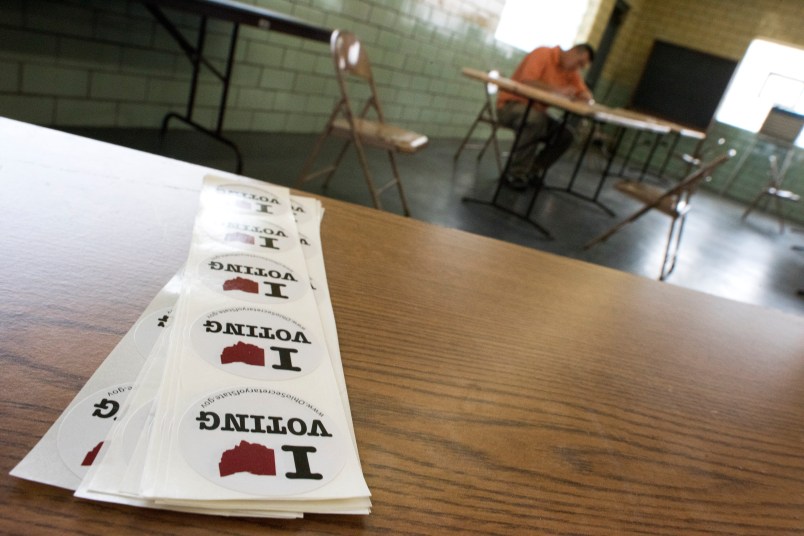One of the disputes fueling the war over Ohio’s purge process was resolved Thursday, with the announcement of a settlement in years-long litigation related to the purge regime.
Under the settlement, some voters who were removed from the rolls this year and in purges going back to 2011 will still be able to cast provisional ballots and have those ballots counted. The settlement covers votes cast through 2022.
Voting rights advocates cheered the settlement, even as they vowed to continue their outreach to 200,000-plus individuals who are on the list to be purged next month.
Ohio’s use-it-or-lose it system of voter purges — known official as the “supplemental process” — has been a source of controversy that traveled all the way up to the Supreme Court. Under the regime, the state sends mailers to registrants don’t participate in an election for two years informing them that they will be removed from the rolls if they don’t participate in the next four years of elections or otherwise confirm their registrations.
The Supreme Court, in a 5-4 decision last year, okayed Ohio’s use of voter inactivity to start the purge process. However, litigation has continued over whether the notices the state sent through 2016 complied with the National Voter Registration Act, which sets guardrails on how states can remove voters from their rolls.
That litigation is what was settled Thursday. While Secretary of State Frank LaRose did not concede that the notices were NVRA violations, he said in a statement that “it made little sense to continue to spend taxpayer resources litigating the legality of a form of notice that is not used anymore.”
(The state made tweaks to the notices in 2016 after the flaws were pointed out. LaRose has indicated that, unlike his predecessor, he would not send inactive voters the notices that start the four-year purge clock.)
The settlement will allow purged voters to have their provisional ballots counted as long as they live in the same county in which they originally registered.
Thursday’s settlement extends a carve-out — known as the APRI exception (named for the plaintiff organization, the A. Philip Randolph Institute) — that courts had temporarily put in place for elections starting in 2016 as part of the litigation. The exception was implemented through the 2018 elections and ultimately covered 8,570 total purged voters who showed up at their polling place to cast a ballot.
It is unclear how many additional people it will cover going forward. An estimated 265,000 voters were purged in January and another 225,000 or so are expected to be purged in September.
But some of the individuals put on that purge list were added because of postal service change-of-address records, not the supplemental process. The exact breakdown of how many voters were put on the list due to the supplemental process versus the change-of-address process is unknown.
In theory the settlement will protect in-person voters who were purged merely due to their inactivity, rather than because they moved or died. Voter advocates still have concerns about the purges’ impact.
Mike Brickner, the Ohio state director of All Voting Is Local, told TPM that poll workers aren’t always fully aware of when they’re supposed to offer provisional ballots and some voters lack the confidence in provisional voting to take advantage of it.
“Part of it is going to be more poll worker training and voter education,” Brickner said.
Read the settlement below:



